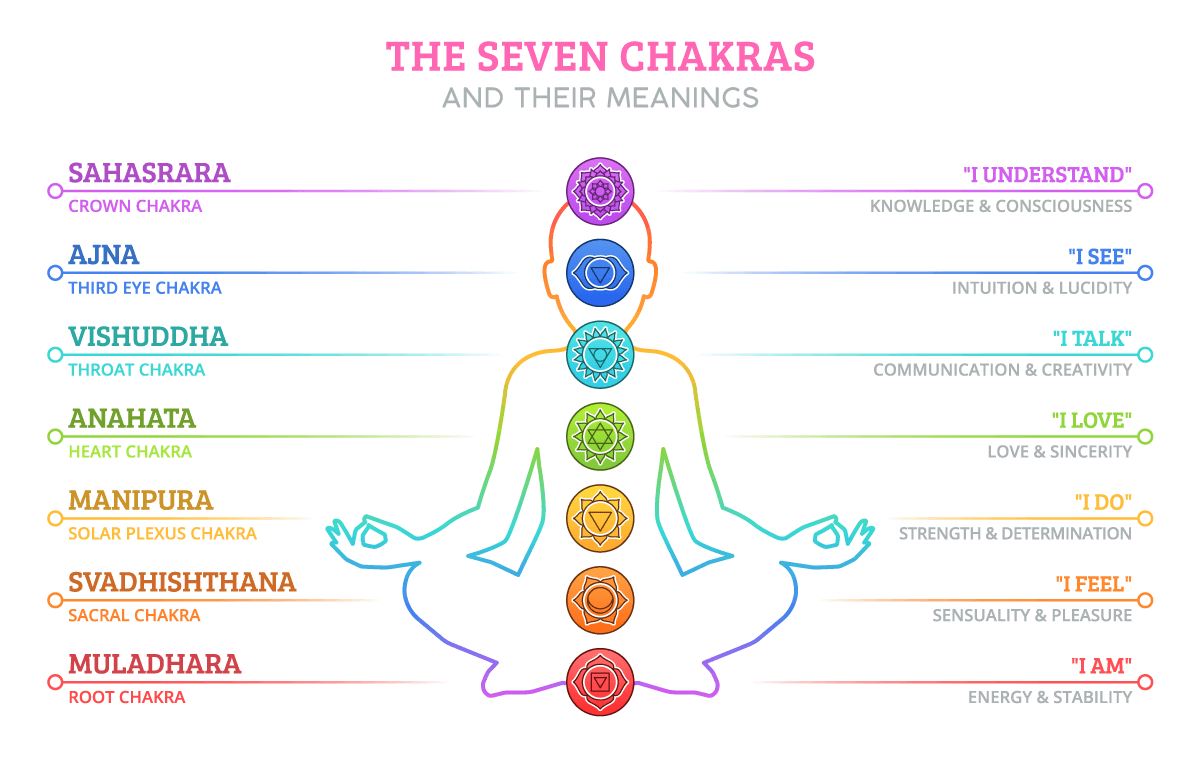Meditation can bring us peace and balanced life, offering a sense of calm that benefits our emotional health and physical health. When preparing for meditative time, it’s important to remember a few things to make your time more contemplative.
- Come to your meditative place with no phone, tv, devices, or outside interruptions
- Set aside at least 5 minutes to meditate; however, preferably as much time as needed
- Sit in comfy position
- Close eyes gently
- Acknowledge to your inside sounds — heartbeat, intestines
- Let thoughts go — no need to sort or chase them
- Select a mantra — a word or phrase of your choice
- Recite your mantra and after some time stop reciting
- Forget about time
What is a Mantra?
A mantra is a word or sounds repeated to aid concentration in meditation. We can break down the word mantra into two parts: “man,” which means to think, and “tra,” which means liberate, instrument, or vehicle. In other words, a mantra is an instrument of the mind — a powerful sound or vibration that you can use to enter a deep state of meditation.
There are three types of mantras:
- Bija — or seed mantras — which are one-syllable sounds that activate the chakras along the center line of the body, such as OM.
- Saguna — deity mantras — because they often focus on some form of the divine such as OM NAMAH SHIVAYA or OM KALI MA.
- Nirguna — without attributes or form — like AHAM BRAHMA ASMI or AHAM PREMA.
What are the 7 Chakras?
Chakra is a Sanskrit word, and it means wheel. In ancient India, Chakras were used as various forms of energy and were the focal point of the human body for meditation. The body has seven main energy centers or chakras. One can use meditation and the right mantras to activate these energy centers.
1. The Root Chakra
The Root Chakra is also known as the Mooladhara Chakra. This chakra, located at the base of the spine, is the color red. This chakra opens your feeling of security, belonging, and prosperity. Chanting the LAM (I Am) manta can help when you feel low on energy.
2. The Sacral Chakra
Also known as the Swadhisthana Chakra, this chakra is located below the navel. Its color is orange. This is a cleansing mantra and is related to sexuality, sensuality, and the desire for pleasure. Chant VAM (I Feel) to open up this chakra.
3. The Solar Plexus Chakra
Also known as the Manipura Chakra, this is located above the navel. Its color is yellow. This chakra allows you to feel powerful and control your destiny. Chant RAM (I Do) to open up this chakra.
4. The Heart Chakra
Also known as the Anahata Chakra, this is located in the chest and heart area. Its color is green or pink. This chakra is associated with love. Chant YAM (I Love), if you are experiencing difficulties in your relationship or are not feeling loving, to open up this chakra.
5. The Throat Chakra
Also known as the Vishuddha Chakra, this is located in the throat and neck. Its color is blue. This chakra is associated with your spiritual and physical voice. Chant HAM (I Speak) if you wish to open up this chakra.
6. The Third Eye Chakra
Also known as the Ajna Chakra, this is located in the center of the forehead, between the eyebrows. Its color is indigo. This chakra is associated with awareness and guidance. Chant OM (I See) to enhance the power of this chakra.
7. The Crown Chakra
Also called the Sahasrara Chakra, this is located at the crown of the head. Its color is white or purple, and it is related to the spiritual connection. Chant OM MANI PADME HUM (Praise To The Jewel in the Lotus) to release this chakra.

The Choice of Mantras
It’s a good practice to stay with one mantra for any session. Mixing mantras is not beneficial and can be confusing for your mind.
- For spiritual intent: OM or RAM
- For compassion: OM MANI PADME HUM
- For relaxation, wellness, personal growth: SO HUM
- For abundance: OM SRI MAHA LAKSHAMAI NANAH
- To release depression: OM SRI RAMAYA NAMAH
- To release negative thoughts about someone: OM TARA TUTTARE TURE SWAHA
Meditate For a Calmer, More Fulfilling Life
Let’s make life simple and recognize the following:
- FEAR — we all have and can let go now.
- ANGER — We all feel and can let go now.
- SORROW — We all feel and can let go now.
- JEALOUSY — We all have felt and can let go now.
- GREED — We need to let it go now.
- IGNORANCE — We all should listen and learn now.
- COMPASSION — We all need and can give now.
- LOVE — We all need and can give now.
- GRATITUDE — We all have it, need it, and need to give it now.
- PEACE — We all need and must locate now.
Now, let’s breathe!
source https://wellcomeomcenter.com/meditation-for-a-simpler-life/
